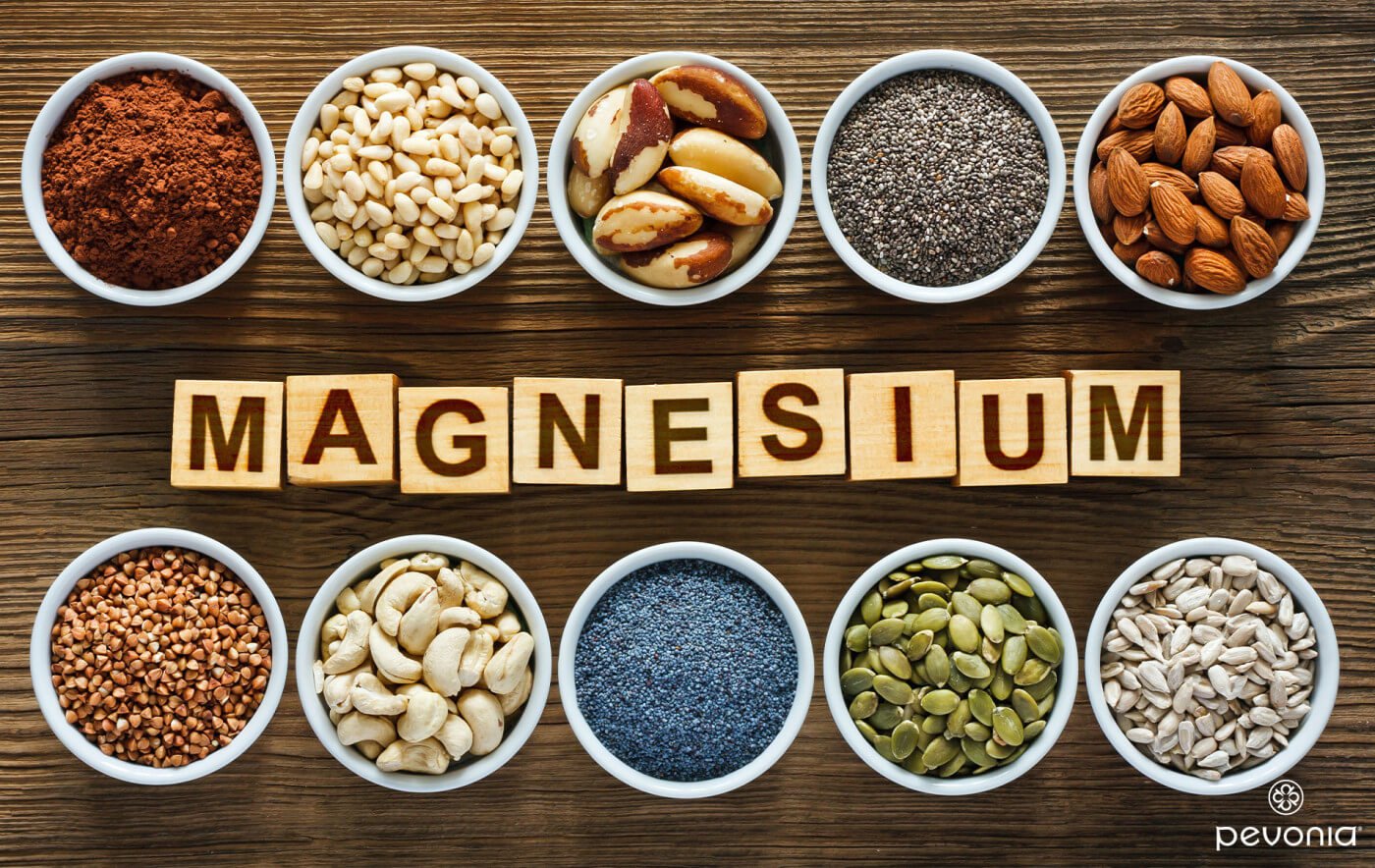
Magnesium – A Mineral Superhero
If you’ve seen magnesium in the media recently, you may have asked yourself, “What does magnesium do?” and “How do I know if I need magnesium?” Here are the ins and outs of this wonder mineral.
What Is Magnesium
Magnesium is an essential mineral required for biochemical processing and functioning. It is typically plentiful in our bodies and utilized in protein production and over 300 enzymatic processes! It helps regulate blood sugar, blood pressure, heartbeat, energy, metabolic functions, sleep, stress, and neurotransmitter production, plus supports bone, heart, and mental health!
Sources of Magnesium In Food
Abundant plant based sources of magnesium in the diet include green leafy vegetables, beans, nuts, seeds, and whole grains. It is also available in smaller amounts from fish, meat, and fortified breakfast cereals and juices. Unfortunately, some food processing removes the nutrient-rich bran and germ, reducing the amount needed to stay healthy. Even water is a source of magnesium. However, some bottled waters remove this essential mineral during processing, whereas mineral water may have too much if ingested in excess. Despite its prevalence, almost 50% of people in the United States and Europe are deficient in this nutrient. So, what makes magnesium low in the body?
- Malnutrition – Inadequate, unhealthy, or unbalanced diets with too much sugar and caffeine contribute to low magnesium levels.
- Medical conditions – These medical conditions deplete magnesium or affect its absorption:
- Gastrointestinal issues (Crohn’s Disease, Celiac Disease, enteritis)
- Insulin resistance & type 2 diabetes
- Gastric bypass surgery complications
- Alcoholism & related pancreas, kidney, and liver issues
- Age – Older adults tend to consume less magnesium than younger folks, have diminished absorption and increased excretion, plus take medications that can affect magnesium levels.
- Anxiety & chronic stress
- Physical exercise
How do you know if you need magnesium? If you experience the following symptoms, it could be a sign you are deficient in magnesium:
- Fatigue & Insomnia
- Mood imbalances
- High blood pressure
- Irregular heartbeat
- Migraines
- Nausea & vomiting
- No appetite
- Constipation
- Leg cramps
- Tingling or numbness in hands and legs
- Weakness or muscle spasms
- Tremors
Unchecked, low magnesium levels may lead to the following:
- Impaired biochemical pathways
- Increased illness risk
- Cardiovascular disease
- Hypertension
- Diabetes
- Osteoporosis
- Alzheimer’s Disease
Benefits of Magnesium Supplements
While getting vitamins and minerals from food is optimum, people with the aforementioned health concerns or those challenged to get adequate amounts in their diet make good candidates for magnesium supplementation.
- What makes magnesium unique? Its multi-tasking abilities help manage blood pressure and blood sugar, restore sleep quality, and boost moods – essential for wellness. It can even reduce migraine frequency and intensity!
- What does magnesium do for sleep? It is thought to reduce cortisol (the stress hormone) and increase sleep-promoting melatonin (a sleep hormone) and GABA (a neurotransmitter), helping regulate the central nervous system.
- What does it do for the skin? Magnesium is a skin health ally, helping inflammation, sleep, and stress—factors that play a prominent role in multiple skin conditions (acne, aging, eczema, rosacea, etc.). It also helps regulate cellular renewal and repair, shielding skin and hair from free radicals and other external damage, facilitating recovery.
But before starting magnesium supplements, talk to your doctor first. Dosage is critical, as too much may trigger digestive upset (diarrhea, nausea, and vomiting). Moreover, people on heart medications, antibiotics, or diuretics and at risk for high magnesium levels may need to abstain. Kidney disease, proton pump inhibitors like omeprazole (Prilosec), esomeprazole (Nexium), or lansoprazole (Prevacid), hypothyroidism, or cortico-adrenal insufficiency are just a few examples of what makes magnesium high and less than ideal for some.
Benefits of Topical Magnesium
Can’t stomach magnesium? You can still take advantage of this phenomenal mineral by using it topically! The most significant benefits of magnesium gel formulas are their abilities to alleviate chronic pain without the side effects of magnesium supplements. Pevonia’s pure, fast-absorbing Marine Magnesium is a concentrated, revitalizing, and purifying formula that diminishes fatigue, muscle tension, aches, cramping, and joint discomfort. What does magnesium do for muscles? It relaxes muscles and helps control contractions, keeping them flexible and loose. This exceptional magnesium gel also rebalances the body naturally, harnessing the power of mineral-rich seawater, which releases negative ions, counteracting unhealthy positive ions due to pollution, sun exposure, and stress.
Massage onto your body after showering with our relaxing natural body wash and pair it with the Micro-Emulsified Massage Oil Anti-Stress and cooling Tension Relief Gel for extra-soothing relief. For a self-care, wellness routine refresh, add this naturally-sourced magnesium gel to a nightly bath for an improved sense of ease and comfort in your body and mind.
Bonus use: You can also try using it to minimize oiliness!
